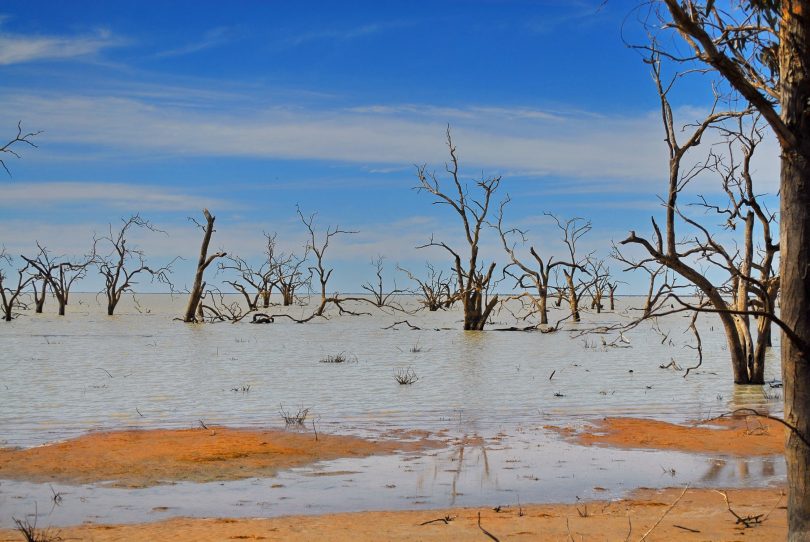In 2018, a small farming village in Victoria’s high country lost a court battle against a water supply company over the right to extract groundwater from the town and sell it to multinational beverage giant Asahi for bottled water.
The Stanley Rural Community Inc, lost the case to Tim Carey, the owner of Black Mount Spring Water, one of the largest water supply companies in the country with properties across the Australia. The Stanley group were ordered to pay costs of $90,000 to Carey, which were subsequently negotiated down to $70,000.
Conflicts similar to the one in Stanley between locals and the bottled water industry over groundwater have, and continue to occur around Australia and in other parts of the world.
But the case in Stanley now serves as a stark warning for residents in regional communities across Victoria wishing to challenge the bottled water industry extracting groundwater in their own towns.
The trouble with groundwater
About 20 million cubic megalitres of the world’s water is groundwater, accounting for about 1.8 per cent of the world’s total water supply and 90 per cent of the world’s freshwater.
It is a hugely valuable water source, and hydrogeologist Peter Dahlhaus explains the sheer quantity of groundwater available can be deceiving when it comes to working out how much you can take out.
“Despite there being a huge amount of groundwater in storage, you have to manage groundwater for the very top of the system,” Mr Dahlhaus said.
“If you lower the water table too far, you cut off the water to rivers and lakes and swamps and ecosystems, and this is where the problem lies.”
This is exactly what the residents in Stanley were concerned about: Carey’s water license allows him to extract 19 megalitres of water a year from his property. The Stanley group argued the extraction would have adverse effects on surrounding agricultural land and deplete the local groundwater resource. Their argument was supported in court by Dahlhaus who was retained by the group as an expert witness.
“I think the community’s concerns are very legitimate and very valid around the allowable uses of water, however the act doesn’t discriminate at all between those,” Mr Dahlhaus said.
Do the laws need changing?
Currently the Water Act, which regulates groundwater use, does not make a distinction between water that’s extracted and used as a productive resource such as for irrigation, and water that is extracted and sold as a commodity as is the case for bottled water.
Ed Tyrie was the president of the Stanley Rural Community Inc during the court case. He said the laws are in desperate need of reform.
“The law in Victoria needs to be changed. The planning act needs to be changed, the water act needs to be changed, if we are to be successful in providing an environmental protection from the taking of groundwater,” Mr Tyrie said.
The Stanley group were arguing their case through the planning and environment act. However, a previously unknown quirk in the water act was introduced during the trial, and specifically excluded the planning and environment act from being able to touch it, which ultimately caused them to lose the case.
The group’s barrister Daniel Robinson said this section of the Water Act should be repealed.
“The practical outcome was that the group actually never got to make their case,” Mr Robinson said.
“They had an excellent, pre-eminent hydrogeologist giving evidence for them at the tribunal, and the fight the whole way was just about the right to have his evidence taken into account in the first place, or even looked at, and them losing meant that it was never looked at.”
Along with the specific section of the Water Act, Robinson identified several problems with the Planning and Environment Acts that are in need of reform. Following the case, Robinson helped the Stanley residents with a campaign to challenge the government and help reform the system but it was never successful.
Tim Carey said he does not support reforms to the Acts in relation to groundwater.
“The legislation is there and it’s been working perfectly well for many years, singling out bottled water use is unnecessary,” Mr Carey said.
“It’s such a small part of the groundwater use, and it is covered by plenty of legislation there already.”
Carey also strongly rejects the claim that water extracted by his company for bottled water is any different to water extracted for other purposes.
“The amount of groundwater used by us or by the bottling industry in general, is just a fraction of all the groundwater extracted throughout the country. Less than half of a per cent of all groundwater is used for the bottled water industry throughout Australia,” Mr Carey said.
“However you use the water, as long as it’s in a sustainable manner, there should be no issue.”
It is this point that the argument ultimately boils down to.
“An Ethical Issue”
It is true that groundwater extracted for the bottled water across the country is only a small amount of the total groundwater extracted. It is also the true that from a purely scientific view, megalitre for megalitre, the difference between water extracted for irrigation or for bottled water on the environment is negligible.
But for those who oppose water bottlers using groundwater in their towns, this is beside the point.
They argue that groundwater is a precious resource that should be prioritised for local farmers or residents who use the water, instead of being trucked out of town for a product that is itself culpable of a range of environmental issues.
“For me it’s an ethical issue,” said Kate McCrae from Musk, a small town in Victoria’s spa country, who has been campaigning against the extraction of groundwater by Tim Carey at one of his properties in the town.
“I don’t like people profiteering out of something that by nature is not really theirs.”
“There’s a lot of water being sucked out of the ground, really not for any practical use other than profit, because it’s being sold to big multinational companies to put in plastic bottles.”
Peter Dahlhaus said he understands these community concerns.
“I think the community concerns are genuine, but I think the ability to much about them is limited by the fact that the legislation doesn’t necessarily reflect the same morals and ethics that the community feel.”
“In one case you’re using groundwater to support a community that live there and work there, and in the other case your supporting an individual to tanker the water out of the district and become quite wealthy.”
While the laws remain unchanged, it’s unlikely residents in towns like Stanley or Musk will be able to do much about the bottled industry continuing to extract groundwater from their towns.
As for reforming the system, Ed Tyrie who is 81 now, said his days of campaigning are over.
“The stress of the whole process took its toll on my health, so while the mind is willing the body is not.”






